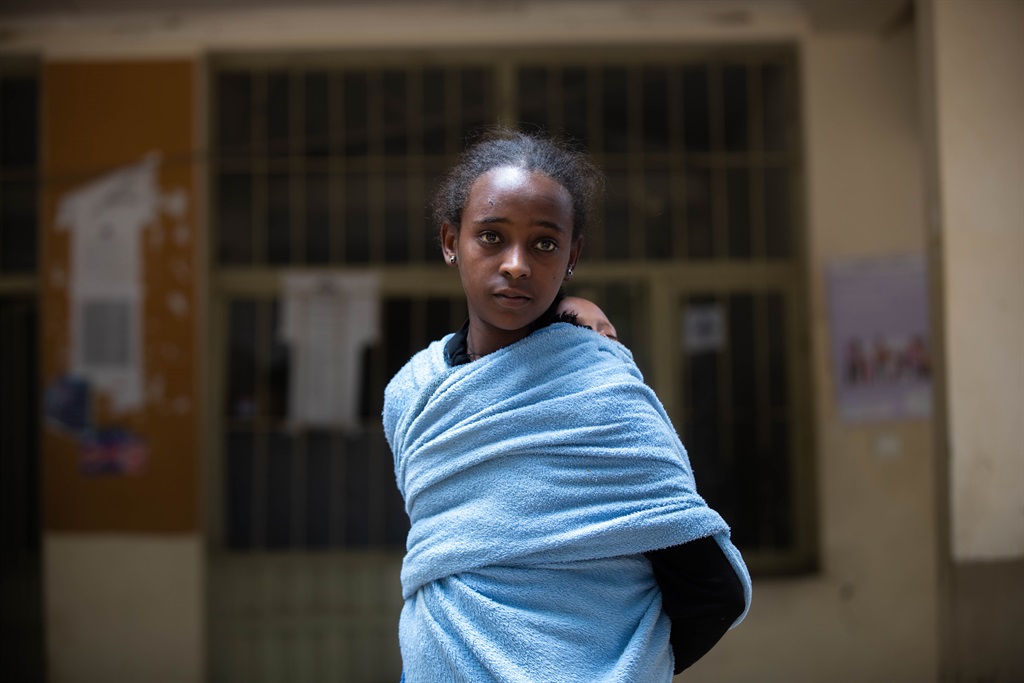
Ethopian teenager Merhawit is clever, eloquent, and brave. She is also displaced by conflict. James Elder details her story.
Looking lost and anxious, Merhawit, 16, tiptoes between a dozen women and their babies at a health centre located 100km from Mekelle, capital of Ethiopia’s northern Tigray region. Everyone here is looking for some kind of relief.
A brutal, five-month civil conflict here has driven more than one million people from their homes, forcing them to leave their livelihoods and hope behind.
Amid ongoing clashes, which have scattered families and left social services struggling to cope, each day brings more displaced children like Merhawit to this desperate place. With her father and older brother cut off by fighting in the arid region west of Tigray, Merhawit, her four siblings, and their mother grabbed a few belongings and fled.
"We started walking when the war started," she says.
Merhawit walked a staggering 300km from her home near the border with Sudan.
"We slept in bushes and begged for food," she says. She slouches and sits: "I saw so many dead bodies by the road."
Merhawit’s eyes grow heavy with tears. But having reached the relative safety of the healthcare centre, reminders of the fighting remain. A new operation room that opened just six months before conflict broke out has been smashed and looted. X-ray machines and patient mattresses are gone. Parts of the ceiling have been removed. Operating beds and incubators for babies have been broken and turned upside down. For Merhawit, it’s just more mindless destruction.
Resident physician at the centre, Dr Glher, agrees: "There was no reason for forces to come here," he says.
According to assessments conducted at the end of February, violence and looting have left nearly 60 per cent of health care facilities in the region are currently not functioning. More than half the per cent of boreholes in 13 towns surveyed aren’t working, and a quarter of the region’s schools have sustained damage from the conflict. The conflict has also been marked by sexual violence against women and children.
I heard traumatic stories from survivors, one as young as 14. I heard reports of gang rapes. The level of cruelty described in these attacks was bewildering.
This year, from 1 January to 16 April, just one centre that Unicef supports has averaged three cases of reported gender-based violence per day. Amid it all, Unicef continues to deliver.
By the end of March, the UN Children’s Fund had delivered 1 000 metric tons of support, from emergency drug kits to tents, nutrition supplies, to school-in-a-carton kits. Unicef also supports more than 640 000 people from the displaced, host, and refugee communities with safe water for drinking, cooking and personal hygiene, which is being trucked across Tigray to conflict-affected areas. Survivors of sexual assault have been provided with medical assistance, psychosocial support and dignity kits at a centre that Unicef supports.
We are also supporting partners to deploy more than 160 social workers to provide child protection case management for vulnerable children, including unaccompanied and separated children. Dozens of brave health teams are also providing emergency support, focusing on everything from pre-natal care to the treatment of malnutrition. They work to reach people in the most remote areas six days a week; on the 7th, they restock supplies. But no one questions that much more is needed.
Merhawti is hungry, and much of her support has come from the local community. She recalls that, on her journey, a stranger gave her a pair of love-heart earrings. But her sadness silences any sparkle they offer. What she wants most now is her father.
"I go to sleep each night thinking he will be here in the morning, and we will be able to go home."
Merhawit hasn’t seen her father or brother since she left. The family is a long way from home.
- James Elder is UNICEF’s spokesperson. Follow him at @1james_elde
To receive Opinions Weekly, sign up for the newsletter here. Now available to all News24 readers.
*Want to respond to the columnist? Send your letter or article to opinions@news24.com with your name and town or province. You are welcome to also send a profile picture. We encourage a diversity of voices and views in our readers' submissions and reserve the right not to publish any and all submissions received.
Disclaimer: News24 encourages freedom of speech and the expression of diverse views. The views of columnists published on News24 are therefore their own and do not necessarily represent the views of News24.
